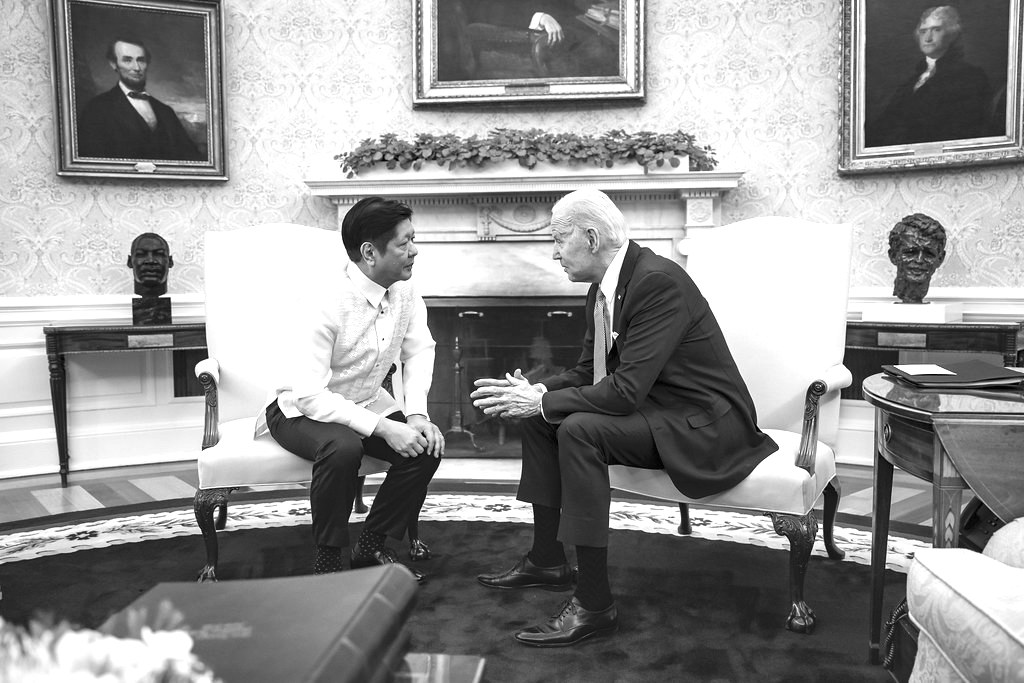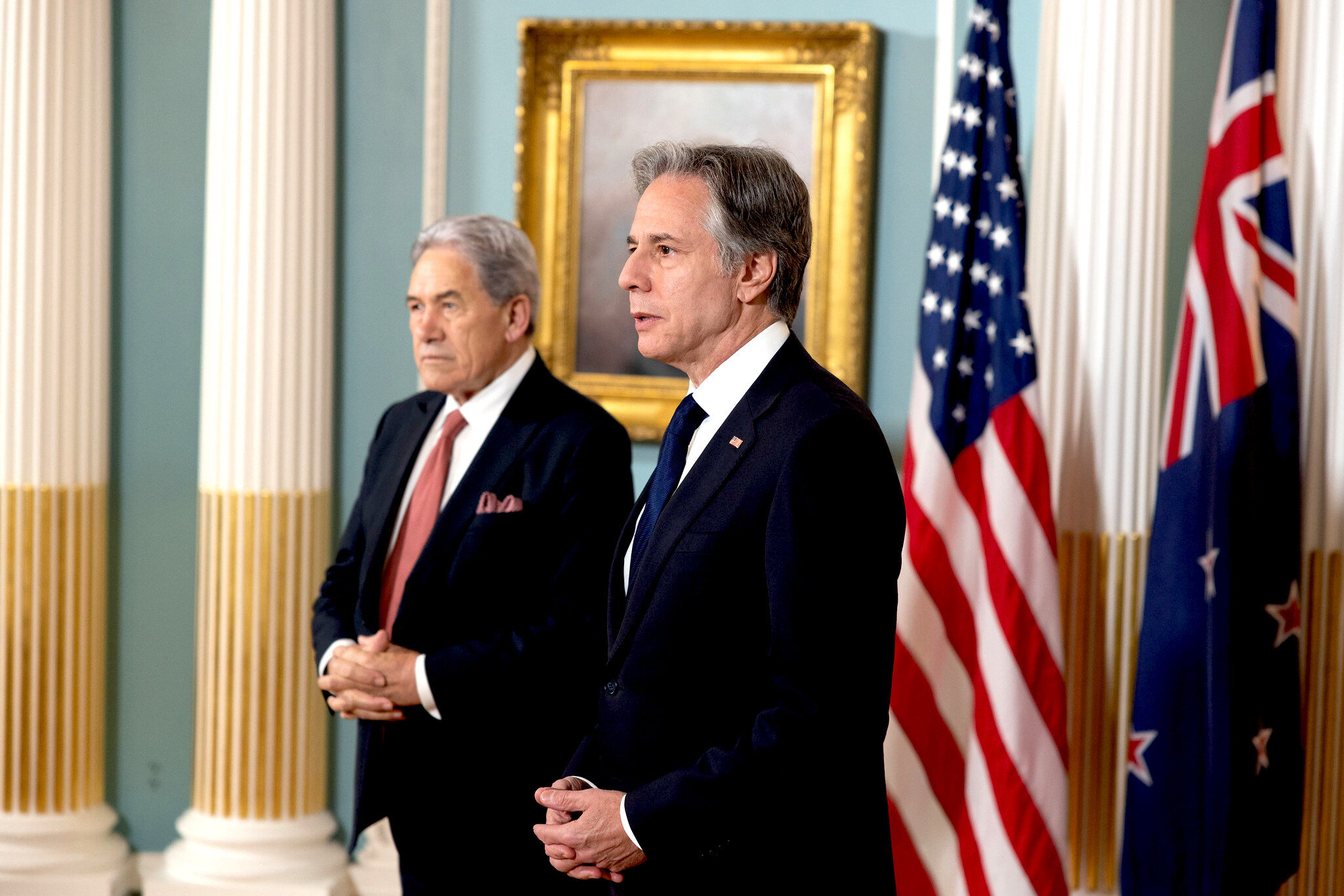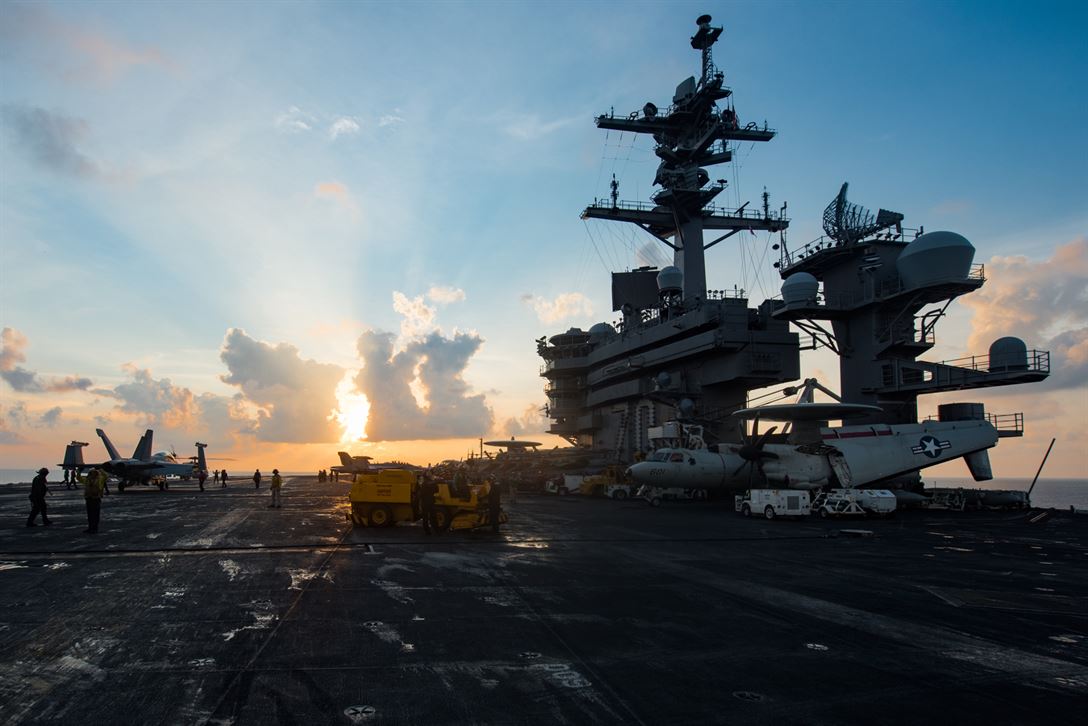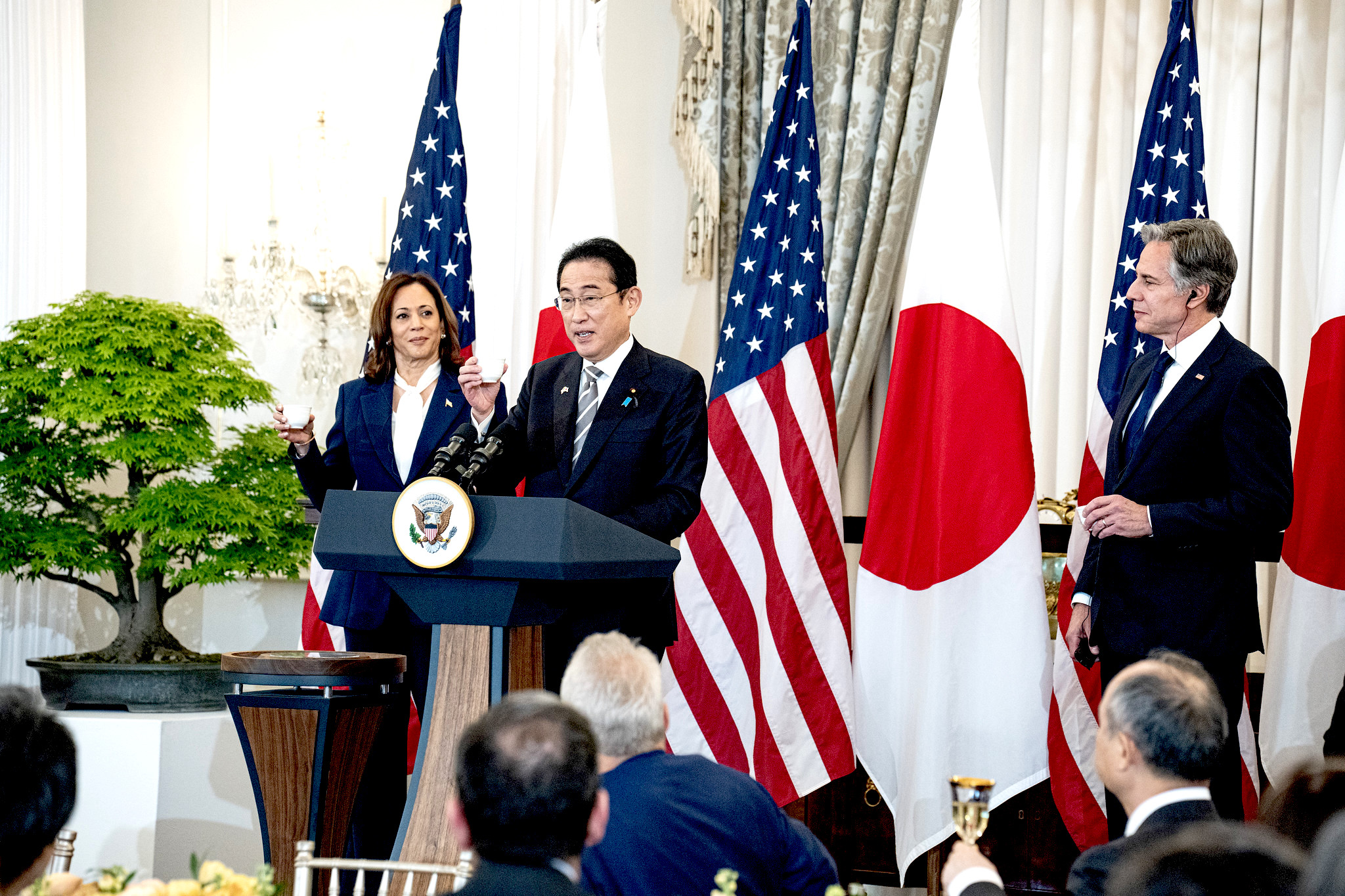Mick Hall on indications that New Zealand, Japan and the Philippines are moving towards greater integration with the U.S.-led military bloc in the region.

President Ferdinand Marcos Jr. with U.S. President Joe Biden at the White House on May 1, 2023. (White House, Adam Schultz)
By Mick Hall
in Whangarei, New Zealand
Special to Consortium News
 Political tensions are increasing in the Asian-Pacific region after a summit in Washington resulted in indications that New Zealand, Japan and the Philippines are moving towards greater integration with the U.S.-led military bloc in the region.
Political tensions are increasing in the Asian-Pacific region after a summit in Washington resulted in indications that New Zealand, Japan and the Philippines are moving towards greater integration with the U.S.-led military bloc in the region.
Philippine President Ferdinand Marcos Jr., Japanese Prime Minister Fumio Kishida and U.S. President Joe Biden attended a trilateral summit on Thursday, where they announced an agreement enhancing military operation, including joint naval exercises alongside Australia in the disputed East China Sea.
It followed a joint statement last Tuesday by Australia, the U.K. and the U.S. confirming Japan as a candidate to join “Pillar II” of the nations’ AUKUS nuclear submarine alliance, established as part of preparations for war with China as the U.S. seeks to contain its peer rival and maintain hegemony.
New Zealand, Canada and South Korea were also touted in the media as Pillar II candidates.
Pillar II is slated to involve technology sharing in areas like artificial intelligence, underwater drones, quantum computing and hypersonic missiles.
China’s Foreign Ministry spokeswoman Mao Ning said signaling the bloc’s expansion would further escalate an arms race “to the detriment of peace and stability in the region.”
The trilateral meeting coincided with a visit by New Zealand’s Foreign Minister Winston Peters to Washington, where he released a joint statement with U.S. Secretary of State Antony Blinken that claimed there was a compelling need for New Zealand to work more closely with the U.S.-led “frameworks and architectures” in Asia-Pacific.
The April 11 statement said: “We share the view that arrangements such as the Quad, AUKUS, and the Indo-Pacific Economic Framework for Prosperity contribute to peace, security, and prosperity in the Indo-Pacific and see powerful reasons for New Zealand engaging practically with them, as and when all parties deem it appropriate.”

Peters and Blinken and in Washington on April 11. (State Department /Chuck Kennedy)
Former New Zealand Prime Minister Helen Clark, the most high-profile critic of the country’s continued drift away from an independent foreign policy, interpreted the statement as a precursor to New Zealand joining Pillar II. She said the decision was undemocratic, as the government had not campaigned on the issue and so had no popular mandate to join the pact.
She told the Q+A TV programme:
“The issue is do we keep our heads and say ‘does what we’re doing contribute to trying to lower tensions, or does it contribute to raising them’. It’s an open secret that AUKUS… is aimed at China. China also happens to be the biggest trading partner for New Zealand twice the size of Australia’s export take from us and rather more than the U.S. So, something quite doesn’t add up here.”
Former PM Helen Clark is raising concerns about New Zealand's apparent increasing closeness with AUKUS, questioning why NZ should join an alliance aimed at countering our biggest trading partner in China
Full interview https://t.co/TuL2lpcwtM pic.twitter.com/l5N2ft09xf
— Q+A (@NZQandA) April 14, 2024
‘Extremely Bellicose’
The escalating security dilemma amid moves by the U.S. to encircle China with more military bases, while enlarging AUKUS, is worrying many in the region.
“I was at an ASEAN [Association of Southeast Asian Nations] workshop in Jakarta last week and it’s pretty clear that everybody in the Pacific is worried,” Pascal Lottaz, associate professor for neutrality studies at Kyoto University, said in an interview with Consortium News. He said:
“ASEAN is worried about what to do if a war breaks out because the rhetoric coming from the U.S. and from China is just so extremely bellicose. When people say like, ‘there was going to be war within the next five years’ or by 2025 that worries everybody. And it could become a self-fulfilling prophecy.”
What adds up for Lottaz, like many geopolitical analysts, is military bloc expansion being part of U.S. machinations to maintain its primacy dangerously playing out in the region.
“I do view this as an outgrowth of the emerging multipolarity and the U.S. trying to subdue China,” Lottaz said.
With the “unipolar moment” of U.S. hegemony now ending as centres of power extend south and once again to the east, Washington is nevertheless pursuing its doctrine of full-spectrum dominance in efforts to contain its peer competitors.
The futility as well as danger of this approach may be underlined by the fact that even states like Iran and South Africa can effectively determine the direction of geopolitical events in defiance of U.S. pressure.
“We’ve never had a moment when smaller partners, smaller parts of the system, could really defy the larger ones,” Lottaz said. “We’ve never had a situation where South Africa could, through the courts, really impact world events or how world events are perceived.”
“I’m also talking militarily,” he added. “Look at how North Korea has very successfully defied not only the U.S. but also China to build nuclear weapons and look where that got North Korea compared to Iraq.
“We also see how the West is not able to subdue Russia and is now getting this huge pushback from the Global South. So, this multipolarity will not inherently change what countries want, but it will change what countries can do and then the question is, will this lead to a management of the situation or is it going to lead to more war?”
The trilateral agreement among the U.S., Japan and the Philippines is likely to alarm China due to its possible outworkings in the South China Sea and concerns over increased U.S. access to neighbouring coastal bases, particularly near conflict hotspot Taiwan.
It may also signal to its neighbours that they can play hardball in the South China Sea if they so wish, as the U.S. offers protection.

The aircraft carrier USS Carl Vinson in the South China Sea in 2017 during a regularly scheduled Western Pacific deployment. (DoD/Matt Brown)
In July 2016, the Permanent Court of Arbitration in The Hague ruled under the U.N. Convention on the Law of the Sea (UNCLOS) that China’s claims to rights and resources with the nine-dash line, which encompasses about 90 percent of the South China Sea, had no legal basis.
China rejected the arbitration, while then Philippines President Rodrigo Duterte decided against pushing for legal enforcement, instead focused on diplomacy, hoping his non-confrontational approach would make an impression.
International relations expert, Otago University’s Professor Robert Patman, said the trilateral agreement could contribute to tensions, but that China could have avoided it altogether.
“China itself is its own worst enemy because it didn’t accept the Hague tribunal’s ruling when the Philippines took China to the international court,” he told Consortium News.
“So, it’s not surprising that there’s been continued tensions between the Philippines and China over different territorial claims. There are about seven claimants in the South China Sea. China, if it had accepted that finding, they could have diffused things considerably and they haven’t. They ignored it and unfortunately, this is a pattern with Great Powers — uphold the rules, or rules-based order, until it contradicts their interests.”
Lottaz agrees. “The Philippines is being bullied by China time and again,” he said. “Duterte’s strategy failed and so now Marcos Jr. is going in the other direction and saying, ‘Well, if being nice doesn’t work, then let’s just allow the Americans to have more bases over here.’ That’s what he’s doing and the Americans are now very happy expanding their bases network.”
Marcos Jr. told the media at the weekend the new trilateral agreement would “change the dynamic” in the region.
The Philippines is increasing the number of military bases that the U.S. can access, notably expanding port facilities in the Batanes Islands, just 125 miles south of Taiwan.
China wasted no time after the trilateral, demanding on Friday the Philippines remove a warship intentionally grounded at Ren’ai Jiao islands, warning any attempts to build fixed facilities and a permanent outpost would be a violation of its sovereignty that would not be tolerated.
Pushing Japan’s Militarization

Japan’s Kishida at a State Department luncheon in his honor, with U.S. Vice President Kamala Harris on left, Secretary of State Antony Blinker on right, April 11. (State Department/Freddie Everett)
Lottaz calls the trilateral summit in Washington a show of political unity, but also a further sign the U.S. is pushing a militarization of Japan and the Philippines’ relationship and that a formal alliance was being charted.
Japan has formidable military and technological capacity, but its pacifist constitution imposed by the U.S. after World War II restricts it from having a conventional standing army.
The Japanese Self Defence Forces (JSDF) have been geared towards internal security, although that is changing. Japan is an Indo-Pacific NATO partner, alongside South Korea and New Zealand. It has contributed to NATO operations in Afghanistan and the Balkans, maintains interoperability with the alliance. A NATO liaison office is being set up in Tokyo this year to cooperate with Australia, Japan, New Zealand and South Korea.
Prime Minister Kishida also announced last year Japan would double military expenditure to 2 percent of its gross domestic product and change military policy allowing it to strike targets abroad.
However, moves like joining Pillar II and sending troops abroad would involve a huge shift in both policy and attitudes in Japan.
Nothing short of a direct attack on the country could possibly remove the constitutional articles governing its military remit, Lottaz said.
“Two thirds majority of Parliament would need to say yes to changing the constitution and then 50 percent of the population in a referendum — double mechanisms, a double lock, which is why it’s so hard to change,” he said.
New Zealand’s move towards Pillar II and NATO has also been incremental. Under its right-wing coalition voted in last year, the journey towards integration has accelerated, as its foreign minister’s joint statement with Blinken demonstrates.
Before Winston Peters’ U.S. trip he had attended a NATO foreign ministers meeting in Brussels on April 3-4, after meeting Polish and Ukraine government officials over the U.S. proxy war with Russia.
Peters said he expected to conclude talks on an Individually Tailored Partnership Programme (ITPP) with the U.S.-led alliance “in the coming months,” an agreement expected to involve significantly greater financial and military assistance to Ukraine as part of collective efforts to maintain the “rules-based international order.”
New Zealand Defence Force soldiers are currently training Ukraine’s military in the U.K.
Like Japan, New Zealand is constrained by its own constitution, which includes a nuclear free law banning nuclear-powered and armed ships from its territory.
Former Australian Prime Minister Scott Morrison at the weekend urged New Zealand to abandon the legislation introduced in 1987, an unlikely scenario given a current bipartisan position on the anti-nuclear tradition. At present AUKUS submarines would be banned from New Zealand shores.
Pillar II is being pushed as a “non-nuclear” aspect of AUKUS, but as China’s ambassador to New Zealand, Wang Xiaolong, writing for Newsroom, pointed out on April 11, “Voices claiming that Pillar II is not violating the Treaty on the Non- Proliferation of Nuclear Weapons (NPT) requirements neglect the interlinks between the two Pillars. The sole purpose for Pillar II is to support and serve Pillar I, either financially or technologically.”
He added:
“And if you read carefully the latest announcement by the AUKUS members, you’ll easily find that one critical reason to invite more participants is to consolidate the dominance of a certain country in the ‘Indo-Pacific’ and shift and spread the exorbitant cost.”
Patman points to considerable pushback in Australia over AUKUS’ cost. Canberra is hoping for delivery of Virginia-class nuclear submarines from the U.S. in the interim sometime in mid-2030, while new SSN-AUKUS submarines are being built at an approximate cost of A$368 billion (US$239bn).
He believes not all nations weighing up Pillar II involvement will be joining any time soon in any case, and in particular Japan, due to tight security rules about sharing technology with partners.
Incredible from Peters. If anything, the public has been led to believe that AUKUS Pillar Two is a “non-nuclear, technology sharing agreement” without broader admission of the diplomatic, trade, and legal ramifications for New Zealand. https://t.co/AkwGxJLVi8
— Marco de Jong (@MHdeJong) April 11, 2024
New Zealand’s national interests, like all Asia-Pacific nations, are not served by joining a military bloc intent on waging war against a country where 30 percent of its exports are destined annually. There could be immediate repercussions for joining, as well as catastrophic consequences in a future war against an imagined enemy.
“The Chinese ambassador to New Zealand was very clear on this in February when he said that New Zealand is a sovereign state and it’s free, if it chooses, to join Pillar II of AUKUS,” Patman said. He added:
“But he made it clear that China opposes AUKUS which it sees as a Cold War construction and he said — and this was a very subtle point — that in areas there would be consequences for New Zealand, including for its economy. This was a veiled warning, in my view, to the farming community, which is the backbone of the country in terms of economics… The Chinese ambassador was reminding a National Party-led government that their core constituency could be disadvantaged.”
More fundamentally, as Pacific historian and foreign policy activist Marco de Jung remarked after the Washington joint statement:
“AUKUS causes the very instability it claims to address. New Zealand is better using its limited resources to support Pacific-led regionalism against superpower competition.”
Mick Hall is an independent journalist based in New Zealand. He is a former digital journalist at Radio New Zealand (RNZ) and former Australian Associated Press (AAP) staffer, having also written investigative stories for various newspapers, including the New Zealand Herald.
Views expressed in this article may or may not reflect those of Consortium News.

Thanks for this article, Mick. It’s timely.
Though I voted for the new government, I’m no fan of its foreign policy. But when deciding how to vote, I concluded that voting out the incompetent Labour lot was the priority. I was obliged to accept those parts of the coalition policy with which I didn’t agree.
In truth, I wasn’t particularly enamoured of the previous government’s approach to foreign policy either. I haven’t forgiven it for its failure to see the transparently false flag incident at Douma for what it was, along with its support of the White Helmets. And as for uncritically climbing aboard the US/UK propaganda train over the Ukraine….words fail me.
Going by Hipkins’ comments last year, I suspect that, had Labour/Greens/Maori Parry won the last election, this country’s situation vis à vis AUKUS would have been pretty much the same as it now is.
In my young adulthood, NZ traded with the USSR and with Iran. It’s difficult to imagine a world in which we’d be able to resume that trade. The US has bullied our governments into halting trade with those polities, just as it is now attempting to bully us out of a trade agreement with China. Yet – as a young relative remarked – the US will put a man on Jupiter, before it agrees to a trade deal with NZ that is worth anything at all.
The US doesn’t give a toss about NZ and its citizens, except insofar as it can trumpet this polity as an ally.
This is a small country: following the independent line is difficult. I don’t agree with much Helen Clark says, but I do agree with her on this. Independence should be the way of the future. I’d like our government to take a Westphalian approach to other polities.
But I suspect that the US has threatened this polity with sanctions of some sort, if it doesn’t toe the 5 Eyes, Western line. Sad: at this end of my life, I’d hoped for better.
I very much agree with you – the Labour Party’s position on AUKUS amounts to little more than grandstanding now they aren’t in power and the evidence suggests Hipkins would have acceded to US demands had they been voted back in.
William Engdahl wrote an article way back in 2016 that explains what the South China Sea disputes are really about and how the Americans are weaponizing this issue against China in terms of both lawfare (like The Hague Court ruling) and actual military deployments in the region.
Long story short: It is about the Americans using a pretext to establish a stranglehold on the shipping lanes that the Chinese economy is dependent on.
Engdahl’s article is uncanny in that it effectively anticipated the spawning of the USA’s QUAD axis, as well as the “dirty role” of Japan and the USA’s Philippines proxy in this cynical stratagem.
Why China Risks War over Those Wet Rocks
hxxps://journal-neo.su/2016/07/21/why-china-risks-war-over-those-wet-rocks/
This article would of been better if it did not take US propaganda of China claiming 90 percent of South China Sea as fact. That’s total propaganda invention akin to the lurid claims of Tibet concentration camps or the Tiananmen Square massacre. When in fact China has always stated the nine dashed line is an ADZ not an EEZ, and the US is twisting what is suppose to be a safety arrangement to prevent planes from been shot down in a war situation like what happened with MH17 in Ukraine to a completely different claim for propaganda purposes.
sigh—-More and more money goes to nefarious purposes as in murdering people in other nations. Meanwhile, in the USA, more and more citizens can barely afford rent or even food. The Middle Class for all intents is disappearing and most people cannot afford the insane rise in home sales or in rentals. It truly appears that America will soon be composed of the unbelievably rich—and the rest of us. Apparently it seems that turning US citizens into serfs is a popular role. Yes—-well so much for that “More Perfect Union,” as perfection in a real democracy seems to be falling by the wayside.
Absolute lunacy.
From a purely business viewpoint it makes much more sense to maintain good relations with China. From a political (and Moral) viewpoint, one only has to look at what the USA is doing around the world, and how it treats its ‘partners’, to know that getting deeply involved with the USA is not going to work out well. Consider:
The USA will insist on military/spy bases in these countries, these will be outside the laws of the hosting country.
Then these countries will have to buy American military products and will be forbidden from buying anywhere else.
USA sanctions will prevent a free and open market for commercial products.
The IMF and World Bank will ensure all national assets are available to be bought by Multinationals.
Any ‘truly’ independent media outlets will be bought out and censored.
So, what’s wrong with sovereign independence ? Is this really what the people want ?
The best approach would have to be holding a referendum to ‘let the people’ decide.
This is all just insanity. The object is to restructure the American Empire in the Far East to recapitulate the madness and chaos already created in Nato and the so-called West where totalitarianism and tyranny enforced by the self-proclaimed Exceptionals now prevails. Have our would-be Asian recruits examined the state of affairs in the American-dominated West? Is America really leading its vassals to a successful world-wide new polity in which every new member emerges a big winner thanks to an extensive re-creation of its economy, politics, trade, military “defence,” class and social structure, ethnic power centers and privileges and similar issues on which the U.S. federal government loves to pontificate and force-feed to its own prols and plebs, most of which receive no real nor permanent benefits, because, since the founding of the American state in 1776, it has always been the default policy that only the very few but very wealthy citizens ever truly get ahead.
In fact, their corporate legal “tools,” vested with the rights and privileges of virtual citizenship (e.g., corporations are “people,” and money = “free speech”), accrue much greater wealth and privilege in short order than most over-worked and over-taxed flunkies do over the course of a life-time. Rather than holidays on the French Riviera, we must limit ourselves to participation in the elite’s “Forever Wars” for high adventure and drama. Is this what the targeted fools in the new “Asian Pacific” Alliance are expected to aspire to by the clowns in Washington who enforce the will of those rascally elites? We all know that the fools in the “North Atlantic” alliance easily fell prey to such machinations long ago in the wake of World War II. Somebody in the deepest bowels of the “Deep State” seems to be cooking up a similar prodromus to World War III. But ask yourself, what was their fate when the dragons in D.C. had to try some serious nut cutting to counter self-liberation movements in Russia, China and the other new bricks in BRICS? Will that fate be accepted as satisfactory by Japan, the Philippines, New Zealand, South Korea and the other lower life forms soon to be drafted as Washington’s next lot of cannon fodder and MIC financiers? I mean the ones who are taxed, not those that collect the profits from the wages of war. Before you folk on the other side of the planet leap onto another Yankee bandwagon that ultimately makes no sense for anyone interested in living long and perhaps prospering, just seriously study the fate soon to befall the American Empire after an existence of a mere 250 years. Equally important, take note of those countries that deliberately grafted themselves to that empire as hapless vassals.
It’s true:
Xxxx://www.theguardian.com/world/2024/apr/18/china-warning-balikatan-exercise-2024-philippines-us-military-drills
But don’t worry, the “thinktanks” know it all:
“Hugh Lovatt, senior policy fellow at the European Council on Foreign Relations thinktank
“The reassuring news is we are not heading towards the Third World War,” he says.”
All the former European empires are joining in NATO for continuing the christian god given goal of ruling the entire world for our culture and maximized profit. It makes selfish mockery of the fantasy of monotheism that god only believes in us. Apparently god needs us for full spectrum dominance of his world and his women too. Along with only western men that were created specifically for his wars and entertainment.. (Japan’s place in this culture war may be an entrapment into war culture that is suspect to redo WWII)
Susan. Bless you. Not only for your point of view but for your gentleness of expression. My sentiments ran along a more coarser route – Utterly stupid New Zealand et al to grind yourself up in the USA mass murder and power is all machine. Don’t you realize you’d serve the well being of your own and the rest of earth’s people by standing up for yourself using wisdom to check the USA militaristic bull headedness everywhere it goes? Vietnam? Afghanistan? Syria? Somalia? Iraq? Huh? Do you really want to be in an adversarial relationship with China? Do you really want to be in the USA ‘s Lackeys Club? Why in heck would you listen to anything that Blinken says? Urgh!
I have never been able to comprehend the idea that the Philippines, of all countries, would want to have such friendly relations with the United States. Did the entire population just completely memory hole the colonial atrocities the US military committed in the early 20th century after they took control of the islands from the Spanish and suppressed independence? Do Filipinos suffer from even more extreme historical amnesia than Americans? How do they reconcile this?
They probably fear Japan more than they fear any colonization from America. Understandable, given what Japan did to the Philippines (and other Asian countries) in WWII
But were Japanese actions any worse than what the USA committed?
Don’t any of these countries realize that the USA is the main tyrant in the world and that they would all be better off not joining Pillar II? In fact the entire world would be better off! My suggestion? Reconsider…